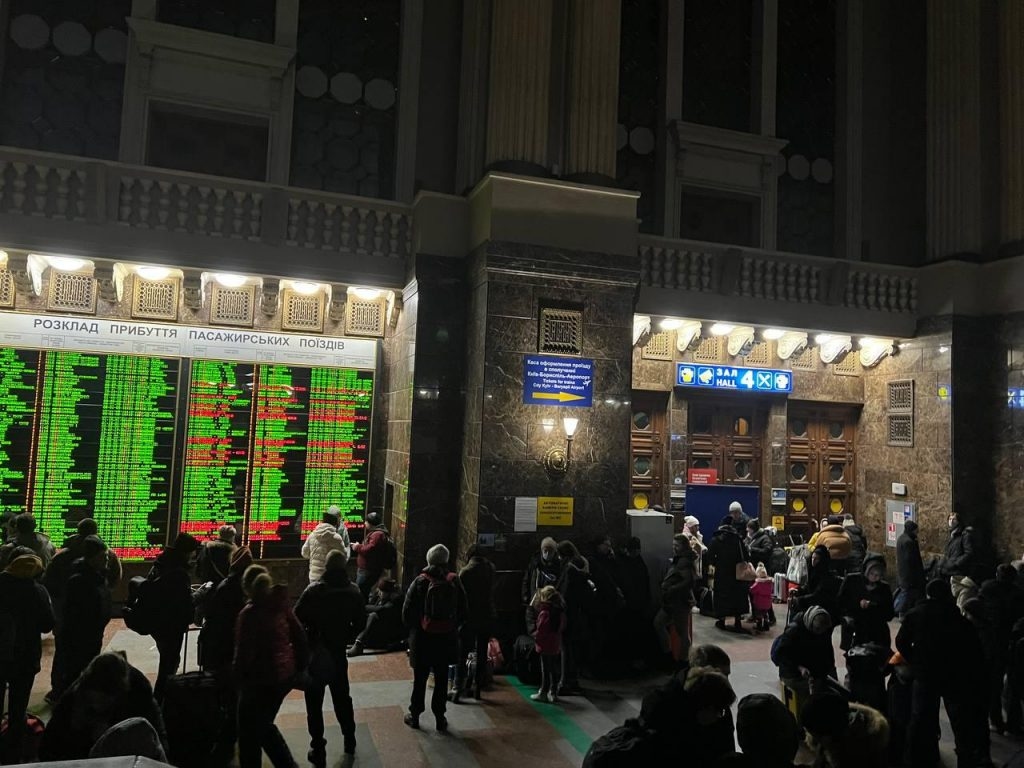Kyiv train station mayhem as thousands rush to flee

Editor’s Note: Ukrainians mentioned in this story were reluctant to have their full names published in the press due to security risks brought by the Russian invasion.
Thousands of people spend hours at Kyiv’s central railway station, each day, hanging onto a slim hope of boarding a train to flee the capital, frequently struck by Russian missiles.
There are no tickets out of Kyiv left, but it makes no difference – the tickets have become useless pieces of paper, as all trains are now evacuation trains, first come first served. Everyone, with or without tickets, has to wrestle their way to the platform, where women, children and the elderly beg the conductors to let them board the overcrowded trains.
“I never thought that I would wake up and my morning would start with a message to tell my family that ‘mom, dad, I am still alive,’” Anna, 31, told the Kyiv Independent on March 1.
Anna, who asked for her surname not to be mentioned, sat on the stairs at the central railway station in Kyiv, holding a big white paper bag close to her. Inside the bag was a small animal carrier with her pet rat.
Though Anna only moved to the capital from her hometown in Dnipropetrovsk Oblast three years ago for a job at a foreign company, she said she had immediately felt a close connection to Kyiv. She first liked it because Kyiv was “big and bright,” but it eventually became something more for her. She says she now was attached to the city and calls it her hometown.
Even when Russia launched its full-scale invasion of Ukraine on Feb. 24, striking several of Kyiv's neighborhoods with missiles, and turning once-prosperous suburbs into ashes, Anna didn’t immediately leave.
“I wanted to stay in Kyiv until the end,” she said. “I love this city. Even now it’s difficult for me to leave.”
But a week after the attack on Kyiv began, Anna found herself at the overcrowded station in a desperate attempt to flee.
“We are scared,” she said. “It’s really scary.”

Broken lives
Some are past the fear stage.
Among those waiting for the train was Tetiana, a 30-year-old Ukrainian woman from Odesa.
“There is no fear inside me anymore,” Tetiana told the Kyiv Independent.
“I’m already in the state of mind where I accept fate and understand that whatever happens, happens,” she said as she teared up. “I want freedom for Ukraine with a peaceful sky and for people to smile. I want things to go back as they were before.”
Another Ukrainian waiting at the station, Oleksandr, 30, said he spent the whole day waiting for his train to come. He told the Kyiv Independent that his train to Dnipro had been canceled or rerouted twice and he’s not sure when the next one would come. Dnipro, some 500 kilometers south of Kyiv, has not yet been targeted by the Russian troops.
Oleksandr, who works in a car shop, was calm. But he admitted that fear got to him when he heard a very loud explosion near his apartment in Kyiv.
Oleksandr’s mother, who lives in Dnipro, had been calling him every day, asking him to come back to his hometown where everything was calmer. The night before he headed to the station, he heard several explosions from his apartment and made the decision to leave Kyiv the next morning.
“War is scary,” he said. “I want peace.”
A way out
As soon as the first train arrived at the platform, a crowd of exhausted passengers rushed to the open door.
Losing patience, passengers began pushing each other to be the first to board the train. Irritated, those evacuating tried to squeeze through, while unintentionally hitting each other with backpacks and luggage.
There were no longer tickets when entering trains, as people stormed into the compartments as soon as the door slid open.
Trains to Lviv, a major urban center 500 kilometers west of Kyiv, were especially packed.
The train compartments soon flooded with evacuees who wanted to flee Kyiv as soon as possible. Some left behind their belongings, such as a baby stroller, when hopping onto the train, taking whatever they could to secure themselves a ride to seemingly any western destination.
As passengers spilled into hallways and there was no longer any space left to fit anyone else in, the train crew stood on the doorway to block the path.
“There is no more space!” the train attendant told those still standing on the platform.
Though many left with despair, dreading the long wait for the next train going to their destination, a few stayed, trying to negotiate with the crew.
“My wife is sick,” a man seemingly in his 50s told the lady standing firmly at the door. Another woman came to the door, saying, “My child is on the train. Please, let me in.”
The conductor handpicked who gets in and who doesn’t. She allowed a woman with a young boy to enter the train but refused many others, including all men who came by later.
“How old are you?” she asked each Ukrainian man after observing that they weren’t with a child.
No single man was allowed to board. Under martial law, men from 18 to 55 years old aren’t allowed to leave Kyiv.
“You have to stay here and defend the country,” the conductor responded again and again.
Minutes later, she closed the door. People remained on the platform, standing in silence, waiting for the next train.










